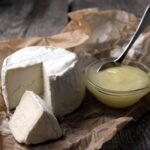No, dogs should not eat dairy products like cheese, yogurt, or milk, because they do not hold much nutritional value and can also cause health issues due to their lactose content. Mostly high in fat, dairy products are not essential for your dog and should only be given as a rare treat.

Caution: This food is generally considered risky by the veterinary community. Dogs should not eat this food and should be monitored for adverse effects.
| Food Safety | Can be eaten but should be avoided due to nutritional issues. |
| Nutritional Issues | Dairy products are high in lactose and most dogs do not have enough lactase to digest it easily. Most dairy products are also high in fat, which can lead to digestive issues. |
| Potential Risks | Digestive issues due to lactose intolerance. The high fat content of dairy products can lead to conditions such as obesity and pancreatitis. Some cheeses can have toxins such as Roquefort. |
| Symptoms | Diarrhea, vomiting, nausea, abdominal pain, lethargy. |
How Much Dairy is Bad for Dogs?
There is no set amount of dairy products that dogs can eat. However, most dogs can safely eat a small amount of cheese, yogurt, and other milk-based products when given as a treat occasionally. Regular consumption of dairy products is bad for dogs and can lead to health issues.
What Makes Dairy Unsafe?
Dairy products are high in lactose. Dogs do not have enough of the enzyme lactase to break down lactose. Therefore, most dogs have problems digesting significant amounts of lactose. Dairy products are also high in fat and when given regularly, they can result in multiple health issues for dogs.
Frequently Asked Questions
-
Ice cream can be classified as a dairy product. However, its additional ingredients like sugar and flavoring make it an unhealthy option for dogs.
-
If you want to give cheese to your dog as an occasional treat, it is best to stick to the cheese that is low in lactose. Cheddar and cottage cheese can be used as a treat for most dogs safely.







